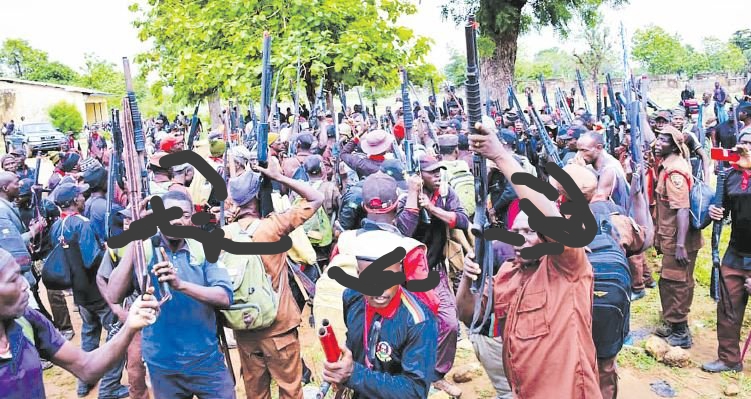Crime & Law
States stall 130,000 forest guard recruitment despite mounting deadly attacks

More than two months after President Bola Tinubu announced the creation of a national forest guard initiative to strengthen internal security, many states have yet to act on the directive, even as violent attacks by armed groups escalate across Nigeria.
The initiative, unveiled during a Federal Executive Council meeting on May 15, mandates each state to recruit between 2,000 and 5,000 forest guards, amounting to an estimated 130,000 personnel nationwide.
But investigation revealed delays and inaction in several states, even as deadly attacks by terrorists, bandits, and militias have claimed over 700 lives since May.
President Tinubu had instructed the Office of the National Security Adviser and the Ministry of Environment to oversee the recruitment and training of the guards. Yet, states like Kaduna, Ondo, Benue, Kano, Gombe, Jigawa, and Akwa Ibom have yet to kick off the process, citing administrative holdups and lack of federal coordination.
READ ALSO:NHFSS commander shot dead in Benue
Kaduna State, with vast forested areas known to harbor criminal elements, is among those yet to begin recruitment. A senior security source, who spoke on condition of anonymity, said:
“You know, when it comes to security matters, His Excellency, Governor Uba Sani, takes them very seriously. He’s passionate about ensuring citizens live in peace.”
In Ondo, Governor Lucky Aiyedatiwa’s aide on security, Mr Gbenga Atiba, said the state was awaiting further instruction from Abuja:
“I’m not sure the recruitment has started because we all just came back from Abuja recently, all security advisers nationwide… They have not started the recruitment.”
Benue State Forest Security Service Commander Jov Peter added: “Recruitment is yet to start here. We need some clarification, and the state government needs to get clarification from the office of the NSA.”
Kano’s delay is rooted in internal disputes between rival forest security factions. Usman Muazu, the state commander of the Forest Security Guards of Nigeria, said:
“Now, under the Tinubu-led administration, another structure has been introduced, which is the Forest Security Guards of Nigeria, leading to rivalry and confusion.”
Some states have made progress. Borno began vetting and training forest guards across its LGAs. Commissioner for Information and Internal Security, Usman Tar, confirmed:
“The recruitment has started in Borno State… We are conducting a diligent vetting, profiling and training of the recruits.”
Niger State, already ahead of the federal rollout, completed an initial round of training. Brig. Gen. Muhammed Bello (retd.), the Commissioner for Homeland Security, said:
“We are ahead of the Federal Government on the exercise… But I can’t tell you the number of people recruited and whether they will bear arms.”
Plateau, Kwara, and Adamawa collectively recruited 1,650 guards. Plateau trained 150 Agro-Rangers, while Adamawa has over 900 recruits undergoing firearm training in a military camp. Kwara State concluded recruitment in six LGAs, employing 600 guards.
The Anambra government also joined in, approving forest guard training under “Operation Udo-ga-chi.” NFSS spokesman Moses Okeke stated:
“The state government has been training forest guards, and a significant number of them have been trained.”
Enugu State, meanwhile, has maintained its forest security outfit since the Nimbo massacre nearly a decade ago, but fresh recruitment remains unconfirmed.
However, experts like Peter Ajonye, Assistant Commander General of Operations of the Forest Security Service in Benue, Nasarawa, and Plateau, questioned the need for new recruitment:
“The Federal Government should make use of the existing hunters who already know the terrain and have adequate knowledge of the forest…”
The federal initiative comes as Nigeria faces a surge in coordinated attacks. Between June 8 and 14, over 300 people were killed in Benue alone, with 100 killed in just one incident in Guma LGA. In Plateau, 19 people died in Fulani militia attacks on June 21. Less than a week later, 17 soldiers were killed in separate assaults on military bases in Niger and Kaduna.
Boko Haram has also reintroduced IEDs. A suicide bombing on June 22 killed 12 in Borno. Days later, a landmine blast along Maiduguri-Damboa highway killed four more.
Amnesty International reports that 3,941 people were displaced in June’s attacks. President Tinubu has since ordered the arrest of the perpetrators and met with survivors.
Despite the urgency, a fully operational national forest guard system remains stalled, leaving vast forest territories vulnerable to criminal exploitation and further attacks.
(PUNCH)




















